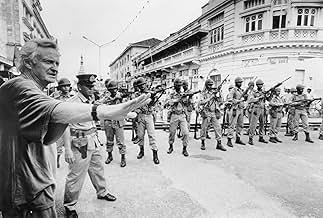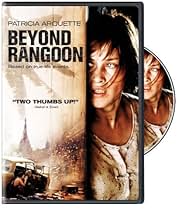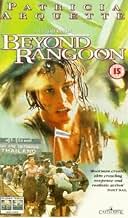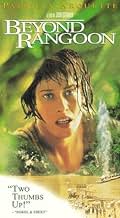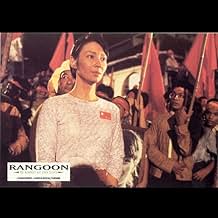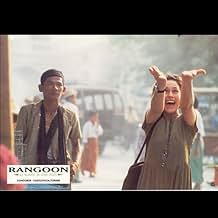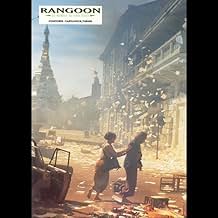CALIFICACIÓN DE IMDb
6.5/10
5.6 k
TU CALIFICACIÓN
Agrega una trama en tu idiomaAn American tourist finds herself in the middle of a political uprising in Burma.An American tourist finds herself in the middle of a political uprising in Burma.An American tourist finds herself in the middle of a political uprising in Burma.
- Dirección
- Guionistas
- Elenco
- Premios
- 2 premios ganados y 3 nominaciones en total
Kuswadinata
- Colonel at Hotel
- (as Kuswadinath Bujang)
- Dirección
- Guionistas
- Todo el elenco y el equipo
- Producción, taquilla y más en IMDbPro
Opiniones destacadas
This movie was working toward two goals: to make a political point and to tell a scary adventure story. It's often difficult to do make a political point and still tell a good story (consider the highly political but rarely-entertaining final season of Ellen). Beyond Rangoon finds a good balance between politics and storytelling.
I already knew that Aung San Suu Kyi had won the 1991 Nobel Peace Prize, and knew something about the oppressive political situation in Burma, so the political message of the movie was mostly a dramatization of what I already knew. But I thought the movie did a good job of telling about Aung San Suu Kyi and the mostly-faceless dictators who have for years tried to silence her. The device of presenting an unfamiliar setting through the eyes of a character that viewers can identify with is fairly common, but it's quite well done in this movie.
Of course, the real measure of the movie was its entertainment value. Arquette was excellent as a young woman whose sister took her to a distant, unfamiliar place to shake her out of her depression over the violent deaths of her husband and son. She is convincingly detached and depressed. Her grieving condition gives her a clear reason for her distracted wanderings into the thick of a dangerous situation she does not understand, something she'd otherwise be much too intelligent to stumble into.
Once the dangers become so obvious that she can see through them even through the cloud of grief, she's trapped, with no easy escape. That sets her on a path of adventure where she needs her intelligence to survive. The writers deserve much credit for making her intelligent and resourceful enough to deal with numerous dangerous situations, while still finding a plausible reason for her to be foolish enough to get into trouble in the first place. The directing is strong also, keeping up the tension throughout the race to escape the forces of the dictatorship.
This movie had additional impact on me and my wife because of other events of the same time period. We were preparing for a trip to India, and heard news reports of Western tourists who had been taken hostage by a terrorist group in India. Avoiding isolated terrorists in a peaceful democratic country is quite a different matter from escaping an oppressive dictatorship. But the movie and the news shared the element of avoiding danger in an unfamiliar country. That common characteristic gave the movie meaning beyond the strength of its own skillful storytelling. The movie illustrates the international tourist's worst nightmare.
I already knew that Aung San Suu Kyi had won the 1991 Nobel Peace Prize, and knew something about the oppressive political situation in Burma, so the political message of the movie was mostly a dramatization of what I already knew. But I thought the movie did a good job of telling about Aung San Suu Kyi and the mostly-faceless dictators who have for years tried to silence her. The device of presenting an unfamiliar setting through the eyes of a character that viewers can identify with is fairly common, but it's quite well done in this movie.
Of course, the real measure of the movie was its entertainment value. Arquette was excellent as a young woman whose sister took her to a distant, unfamiliar place to shake her out of her depression over the violent deaths of her husband and son. She is convincingly detached and depressed. Her grieving condition gives her a clear reason for her distracted wanderings into the thick of a dangerous situation she does not understand, something she'd otherwise be much too intelligent to stumble into.
Once the dangers become so obvious that she can see through them even through the cloud of grief, she's trapped, with no easy escape. That sets her on a path of adventure where she needs her intelligence to survive. The writers deserve much credit for making her intelligent and resourceful enough to deal with numerous dangerous situations, while still finding a plausible reason for her to be foolish enough to get into trouble in the first place. The directing is strong also, keeping up the tension throughout the race to escape the forces of the dictatorship.
This movie had additional impact on me and my wife because of other events of the same time period. We were preparing for a trip to India, and heard news reports of Western tourists who had been taken hostage by a terrorist group in India. Avoiding isolated terrorists in a peaceful democratic country is quite a different matter from escaping an oppressive dictatorship. But the movie and the news shared the element of avoiding danger in an unfamiliar country. That common characteristic gave the movie meaning beyond the strength of its own skillful storytelling. The movie illustrates the international tourist's worst nightmare.
I first saw Beyond Rangoon years ago, and my interest in South East Asia has kept growing ever since.
Laura's husband and son have just been murdered. Seeing her sink into depression, her sister takes her on a tour of Burma hoping the change will somehow get her back on track. Due to a thoughtless mistake Laura finds herself trapped in the country on her own, finding herself face to face with the exactions of the military dictatorship. She meets an old professor who becomes her only way out of the country. During their escape through the Burmese jungle, tracked by the military, Laura finds herself forced to fight her way back into life. She gradually lets go of her own pain to focus on the country's wounds. And I just love the ending, it's a wise one.
I'd like to answer some other reviewers' comments: Laura is MEANT to be in that comatose don't-give-a-damn state. Arquette's interpretation is spot on. That's the sort of state I'd be in if I had seen the people I cherish the most lying in a pool of blood on my living room floor. This is what makes her wander out of the safety of the US Embassy even though as an intelligent woman she's bound to sense the danger of doing this. What's happened to her has made her almost suicidal, "I was stone myself".
The film is well paced, the acting is good, and the scenery is beautiful. Intense and food for thought, this film will be haunting you for days. That's an 8/10.
So what is Columbia waiting for to release it on DVD ??
Laura's husband and son have just been murdered. Seeing her sink into depression, her sister takes her on a tour of Burma hoping the change will somehow get her back on track. Due to a thoughtless mistake Laura finds herself trapped in the country on her own, finding herself face to face with the exactions of the military dictatorship. She meets an old professor who becomes her only way out of the country. During their escape through the Burmese jungle, tracked by the military, Laura finds herself forced to fight her way back into life. She gradually lets go of her own pain to focus on the country's wounds. And I just love the ending, it's a wise one.
I'd like to answer some other reviewers' comments: Laura is MEANT to be in that comatose don't-give-a-damn state. Arquette's interpretation is spot on. That's the sort of state I'd be in if I had seen the people I cherish the most lying in a pool of blood on my living room floor. This is what makes her wander out of the safety of the US Embassy even though as an intelligent woman she's bound to sense the danger of doing this. What's happened to her has made her almost suicidal, "I was stone myself".
The film is well paced, the acting is good, and the scenery is beautiful. Intense and food for thought, this film will be haunting you for days. That's an 8/10.
So what is Columbia waiting for to release it on DVD ??
While the movie has its flaws, it brings to light some of the problems that come with living in a country that has no democracy. It makes you empathize with the people under such a government and makes you want to learn more about their lives, their struggles and a potential leader Aung San Suu Kyi. It makes one wonder why our government will interfere places we are not wanted yet ignore those who ask our help.
"The trip was Andy's idea. It was easier to say 'Yes' than argue. Always that way with my sister. She meant well. A touch of the exotic east would take me away from everything that reminded me of what had happened..."
So begins the film "Beyond Rangoon", about an emotionally troubled American who is urged by her sister to take a vacation in Rangoon, Burma to try and get over the devastating loss of her husband and child. While there, she becomes entertwined in very real political upheavel. The film depicts the marches and rallies and protests realistically, and shows massacres that are hard to watch, but need to be heard. The political upheavals that really happened in Burma in 1988 were never heard or talked about in the US, and needed to be. Aung San Su Kyi was a woman who was trying to bring Burma (Now Myanmar) to democracy, but was denied by the government. She still tried to lead her people to freedom, and the struggle still exists today. The film has powerful writing, directing, cinematography and acting. The absolutely chilling and powerful score by Hans Zimmer lends riveting power to each scene, and fills triumphant moments with triumph. Patricia Arquette portrays the American, Laura Bowman, with depth, very frozen by the horrors of her loss, "I tried finding something in those stone statues, but nothing stirred in me. I was stone myself", but slowly she sees the meaning of her life and others in her journeys throughout Rangoon and beyond. A terrific film. And it needs to be watched. At home, and in history or government classes. **** stars.
So begins the film "Beyond Rangoon", about an emotionally troubled American who is urged by her sister to take a vacation in Rangoon, Burma to try and get over the devastating loss of her husband and child. While there, she becomes entertwined in very real political upheavel. The film depicts the marches and rallies and protests realistically, and shows massacres that are hard to watch, but need to be heard. The political upheavals that really happened in Burma in 1988 were never heard or talked about in the US, and needed to be. Aung San Su Kyi was a woman who was trying to bring Burma (Now Myanmar) to democracy, but was denied by the government. She still tried to lead her people to freedom, and the struggle still exists today. The film has powerful writing, directing, cinematography and acting. The absolutely chilling and powerful score by Hans Zimmer lends riveting power to each scene, and fills triumphant moments with triumph. Patricia Arquette portrays the American, Laura Bowman, with depth, very frozen by the horrors of her loss, "I tried finding something in those stone statues, but nothing stirred in me. I was stone myself", but slowly she sees the meaning of her life and others in her journeys throughout Rangoon and beyond. A terrific film. And it needs to be watched. At home, and in history or government classes. **** stars.
John Boorman, I like your movies. Your movies are cerebral, but do not rely on symbolism or language to convey thought. They seem to rely on emotions, sometimes clichéd (not always a bad thing, and you do handle it well, in that your people say what one would expect a person to really say in that situation, even if it has that feel of a cliché), and lots of water and green vegetation, mud, earth, breath in the cold, dragon's breath, stuff like that.
Your films remind me of David Lean and David Attenborough, which makes sense, but, as you would probably agree, more dreamy.
A possible misgiving is an expectation set up with your stuff that right away tips me in a certain direction, and takes away possible surprise.
Not so with Beyond Rangoon, which I found was beyond the others you have done that I am most familiar with (Emerald Forest, which I need to see again, and Excalibur).
Beyond Rangoon is the story of one woman set against the backdrop of events in Myanmar (Burma). The story makes no attempt to give us a comprehensive picture of those events, just an introduction, but it is a solid introduction. I feel I know a lot more, and I have a sense of connection with those people that I did not have before, however tenuous from my place of privilege.
Overall I found the story moving and filled with meaning. I always like Patricia Arquette, and her leading man in this film is just great. Actually, she's the lead in this film, and that is what is great.
So much of the film is told with film language, that is, images, that I can see some critics being a little impatient with it, but it is probably because they overanalyze and find it fearful to feel anything too deeply.
Anyone out there wondering if this movie is worth it should watch it to find out. It will not be a waste of your time, whether you like it or not.
Your films remind me of David Lean and David Attenborough, which makes sense, but, as you would probably agree, more dreamy.
A possible misgiving is an expectation set up with your stuff that right away tips me in a certain direction, and takes away possible surprise.
Not so with Beyond Rangoon, which I found was beyond the others you have done that I am most familiar with (Emerald Forest, which I need to see again, and Excalibur).
Beyond Rangoon is the story of one woman set against the backdrop of events in Myanmar (Burma). The story makes no attempt to give us a comprehensive picture of those events, just an introduction, but it is a solid introduction. I feel I know a lot more, and I have a sense of connection with those people that I did not have before, however tenuous from my place of privilege.
Overall I found the story moving and filled with meaning. I always like Patricia Arquette, and her leading man in this film is just great. Actually, she's the lead in this film, and that is what is great.
So much of the film is told with film language, that is, images, that I can see some critics being a little impatient with it, but it is probably because they overanalyze and find it fearful to feel anything too deeply.
Anyone out there wondering if this movie is worth it should watch it to find out. It will not be a waste of your time, whether you like it or not.
¿Sabías que…?
- TriviaSpalding Gray had previously been in another film about a South East Asian conflict: "The Killing Fields" (1984), which documented the genocide from the Khmer Rouge in Cambodia.
- ErroresWhen Patricia Arquette arrives at the railroad station, a train is standing on the track nearest the platform. When she runs to get on the train, it is just pulling in to the station.
Selecciones populares
Inicia sesión para calificar y agrega a la lista de videos para obtener recomendaciones personalizadas
- How long is Beyond Rangoon?Con tecnología de Alexa
Detalles
Taquilla
- Presupuesto
- USD 23,000,000 (estimado)
- Total en EE. UU. y Canadá
- USD 5,750,110
- Fin de semana de estreno en EE. UU. y Canadá
- USD 2,007,527
- 27 ago 1995
- Total a nivel mundial
- USD 5,750,110
- Tiempo de ejecución1 hora 40 minutos
- Color
- Mezcla de sonido
- Relación de aspecto
- 2.39 : 1
Contribuir a esta página
Sugiere una edición o agrega el contenido que falta

Principales brechas de datos
By what name was Beyond Rangoon (1995) officially released in India in English?
Responda

